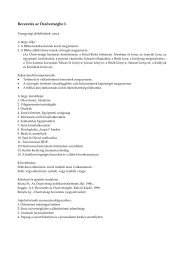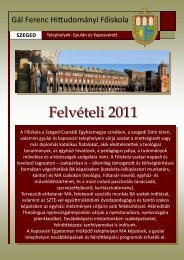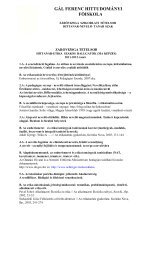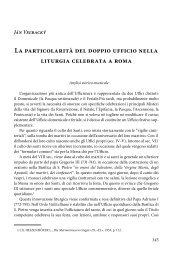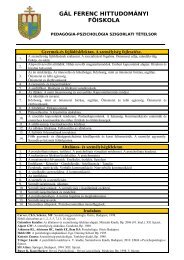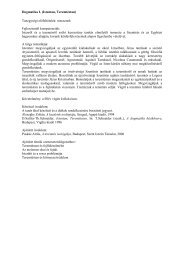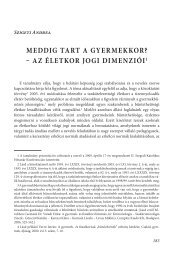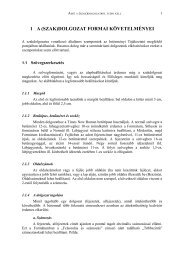Deliberationes - Gál Ferenc Hittudományi Főiskola
Deliberationes - Gál Ferenc Hittudományi Főiskola
Deliberationes - Gál Ferenc Hittudományi Főiskola
Create successful ePaper yourself
Turn your PDF publications into a flip-book with our unique Google optimized e-Paper software.
abstracts<br />
Krisztina Voit: Hungarian Business Houses in Slovensko<br />
– Book Publishing and Export between the<br />
Two World Wars<br />
Hungarian book publishing and trading struggled to survive in the wake of World War<br />
I, and well into the 1920’s because of the ensuing changes to the Austro-Hungarian Empire.<br />
The Comenius Joint Stock Company, founded by Adolf Lantos, and parent company of<br />
Comenius Enterprises, was based in Bratislava and in Budapest. The companies were<br />
founded by Lantos who was engaged in currency speculation, as a lucrative means to<br />
circulate book stocks bought out in Hungary with a right of exclusivity, to be exported<br />
and sold at 100% profit.<br />
The initial hopes of book traders in Slovensko (Hungarian, German and in part<br />
Slovakian) soon evaporated as they realized that the Hungarian reading public in<br />
Slovensko could not afford to pay such high prices for books. Growing stockpiles could<br />
not be sold resulting in a series of bankruptcies, including Lantos’ companies.<br />
Further compounding these conditions were the centralist policies emanating from<br />
Prague. It was in these conditions that the once flourishing Slovensko book trade came<br />
to an end, and by 1923-1924 Hungarian book exports were at a complete standstill.<br />
By 1923 however, a renewed interest in the Hungarian book trade could be seen.<br />
Several of the larger companies were merged under a new marketing venture comprising<br />
Athenaeum, Franklin Company and in part, the Révai Joint Stock Company, representing<br />
a new vision in the book market.<br />
By 1927-1928, new possibilities were beginning to take shape for the export of<br />
Hungarian books. These developments led to the founding of new companies which<br />
used Slovakian names. These firms formed usually within the framework of a joint stock<br />
company, where the majority of shares were held by the board of directors. The company<br />
name to be registered was of more importance than its geographical location therefore<br />
the company itself could be located in Budapest. A company which functioned externally<br />
as a Slovakian firm could assure the export of Hungarian books, and within a specific<br />
framework could even publish Hungarian literature. These “juggler machinations”,<br />
inspired by Jenő Molnár, proved to be extremely successful in the period between the<br />
two World Wars.<br />
Jenő Molnár (1882-1951) remains unique in this story as it was he who insisted on<br />
using his traditional Hungarian name form, as he had used it in Eperjes pre-First World<br />
War. In all documents – including those during the tribulations of the twenties and the<br />
forties –, his name can be read as Molnár Jenő. He was among the first to realize that in<br />
the new post war environment there was little chance of survival other than to publish<br />
basic works in the mother tongue of the Slovakian nation. All that had to be done was<br />
translate these works from Hungarian to Slovakian (Civil codes, manuals, dictionaries,<br />
268



